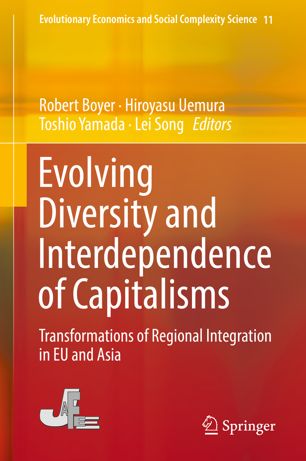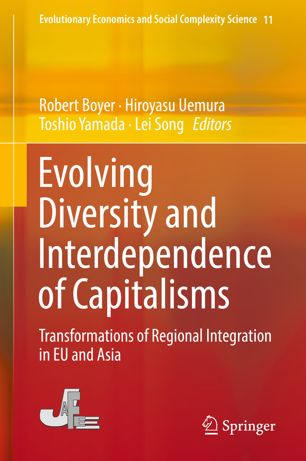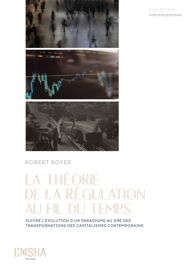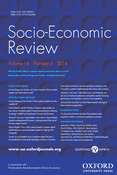Socio-Economic Review , 2021.
Résumé
L’émergence de plates-formes multinationales organisant l’interaction d’une multiplicité d’entreprises et de consommateurs est analysée par l’approche de la théorie de la régulation. La chute de Yahoo! puis l’essor de Google, Amazon, Facebook, Apple et Wikipédia donnent une impulsion sans précédent à la construction de nouvel écosystème porté par un flux constant d’innovations sur l’information. Peut-elle définir une nouvelle configuration dans l’histoire des capitalismes ? Contre l’hypothèse d’un déterminisme technologique, différents types de plateformes peuvent coexister et dessiner des reconfigurations contrastées du monde moderne : un capitalisme de plateformes de marché aux USA, une société de contrôle panoptique en Chine, alors qu’idéalement l’Union européenne vise à convertir l’information en un Commun mondial, surveillé par les citoyens.
- Les matins de l’Economie, France culture, Pour enrichir et approfondir les questions d’actualité, deux séquences d’invités : la Question du jour à 7h13 que Guillaume Erner posera au meilleur expert du sujet, Robert Boyer. Le grand thème du jour qui occupera, en deux parties, le cœur des Matins de 7h40 à 8h00 et de 8h20 à 8h45.le 13 janvier 2021.
Intervenants : Robert Boyer (Centre Cournot, Institut des Amériques), Xavier Ragot (OFCE), Les débats du Centre Cournot, en ligne, mars 2020.
Robert Boyer, Hiroyasu Uemura, Toshio Yamada, Lei Song, in Boyer Robert, Toshio Yamada, and Lei Song (Eds), Evolving Diversity and Interdependence of Capitalisms. Transformations of Regional Integration in EU and Asia, book series (EESCS, volume 11), Springer, Japan KK, part of Springer Nature 2018, p. 459-483.
in Boyer Robert, Toshio Yamada, and Lei Song (Eds), Evolving Diversity and Interdependence of Capitalisms. Transformations of Regional Integration in EU and Asia, book series (EESCS, volume 11), Springer, Japan KK, part of Springer Nature 2018, p. 259-302
in Boyer Robert, Toshio Yamada, and Lei Song (Eds), Evolving Diversity and Interdependence of Capitalisms. Transformations of Regional Integration in EU and Asia, book series (EESCS, volume 11), Springer, Japan KK, part of Springer Nature 2018, p. 17-64
Boyer Robert, Toshio Yamada, and Lei Song (Eds), Book, Part of the Evolutionary Economics and Social Complexity Science book series (EESCS, volume 11), Springer, Japan KK, part of Springer Nature 2018
Introduction
This book integrates three levels of political–economic analysis: first a comparative institutional analysis of the varieties of capitalism in both Europe and Asia, second a macroeconomic analysis of industrial structural change and economic dynamics of the national economies in Europe and Asia, and then an encompassing analysis of international production linkages and international financial instability which determine the long-term patterns of regional integration in Europe and Asia. The comparison of the European Union and ASEAN delivers some key conditions for a viable long-term regional economic integration to cope with contrasted capitalisms and growth regimes: either pragmatism in the choice of an exchange rate regime, or a form of fiscal federalism. The reader will also find a genuine analysis of the dynamism of the Chinese economy, a study on institutional changes and de-industrialization in Japan, and the increasing international production linkages among China, Japan, Korea, and ASEAN. It is shown how the enlargement of the European Union and the Euro triggered the diverging competitiveness and macroeconomic performances that led to the crisis of a six decades long economic and political process. This book is the result of long lasting Asian–European collaborative research. It is a milestone in the historical and comparative analysis along the régulation theory that aims at understanding the long-run transformations, renewed diversity and interdependence of capitalisms.
Suivre l’évolution d’un paradigme au gré des transformations des capitalismes contemporains, R. Boyer (dir), Avril 2018, Editions des maisons des sciences de l’homme associées, Collection interdisciplinaire EMSHA , La Plaine Saint Denis
Le présent ouvrage propose au lecteur un aperçu sur la trajectoire intellectuelle d’un groupe de chercheurs qui se sont attachés à éclairer certaines questions liées à la recherche sur l’économie et la société selon les approches développées par la Théorie de la Régulation, ceci à travers un permanent aller-retour entre les enseignements et prédictions du cadre conceptuel élaboré pour rendre compte de la rupture des Trente glorieuses et de la réalité des évolutions observées depuis lors.
La particularité du présent ouvrage est de donner à voir l’ajustement de ce paradigme d’année en année jusqu’à la période contemporaine. En quelque sorte, il propose de visiter le laboratoire d’où sont sorties les nombreuses publications dérivées de la Théorie de la Régulation.
In : La dette souveraine: Etat et économie politique, sous la direction de Julia Christ et Gildas Salmon, Collection « Raisons pratiques », Éditions de l’EHESS, Paris, Mars 2018, p. 9-47.
Socio-Economic Review, Discussion Forum: « Brexit: understanding the socio-economic origins and consequences » , 2016, Vol. 14, n° 4, p. 836-845.
Abstract
Jacqueline O’Reilly, Julie Froud, Sukhdev Johal, Karel Williams, Chris Warhurst, Glenn Morgan, Christopher Grey, Geoffrey Wood, Mike Wright, Robert Boyer, Sabine Frerichs, Suvi Sankari, Akos Rona-Tas and Patrick Le Galès
The unprecedented geopolitical shift resulting from Brexit reflects deep socio-economic fault lines within and beyond the UK. In many ways foreshadowing the US presidential election of Donald Trump, Brexit brought to the surface and gave a public voice to socio-economic divisions that were deeply embedded, sometimes illogical, but until now had either been ignored or hushed out of ‘respectable’ public debate. This Discussion Forum emanates from a spontaneous seminar organized 2 days after the Brexit vote on June 25, 2016 as part of the SASE conference held in University of California–Berkeley and followed by an open call for papers by Socio-Economic Review. The papers here draw attention to the origins of the Brexit vote in deep-seated socio-economic divisions (O’Reilly), widening differences in economic performance across sectors and regions of the UK (Froud, Sukhdev and Williams) and the growth of poor quality jobs (Warhurst). Meanwhile, the political dynamics of the Brexit vote were also shaped by the fractured nature of UK business elites (Morgan), divisions between locals and cosmopolitans (Grey) and creative but muddled actions of elites that arguably generated consequences they themselves failed to fully anticipate (Wood and Wright). From the perspective of Europe, Brexit reflects a history of dysfunctional economic policy in Europe that prioritized market competition in ways that neglected and ultimately undermined solidarity (Boyer). Here, Brexit reflects a political strategy to both renationalize and recommodify solidarity in the face of fears over migration, and which are likely to have major consequences for social solidarity in Europe more generally (Frerichs and Sankari). However, Brexit is unlikely to provide a durable social and political solution to the wider tensions between globalization and democracy, which also affect all countries throughout Europe (Rona-Tas). Ultimately, the Brexit vote underlines social divisions that combine class inequalities with regional ones, not just in Britain but throughout Europe (Le Galès).




